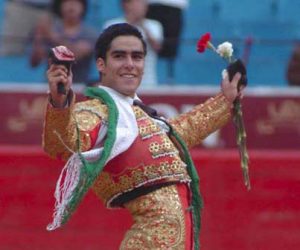Desde Afuera, Hacia Adentro: The Bulls in Tijuana and the World

Tijuana “Summer of Opportunity” – At a press conference last week, Casa Toreros announced the cartels for the first four corridas of the summer temporada. In what could be a genuinely innovative model for the Mexican empresarial establishment, the management team headed by Pablo Moreno and Juan Pablo Corona have contracted 18 toreros of varying ages, talents and projections, and set them into a kind of taurine “round robin” where they will face one bull each, with a chance to be named the triunfador of the particular corrida in which they participate, and thereby inclusion into the final regular corrida (so far) of the year, on August 30, where they will face the customary two bulls each.
The cartels are:
Sunday, July 5, Cesar Castaneda, Victor Mora, Ernesto Javier, “Calita”, Oliver Godoy, Alejandro Lopez, and Ricardo Frausto, with bulls from the El Vergel ranch of Nuevo Leon.
Sunday, July 19, Colombian matador Ricardo Rivera, Manolo Juarez, “El Poeta”, Juan Luis Silis, Gerardo Adame, Lorenzo Garza Gaona, and the Tijuana presentation of the Eurpoean/Mexican sensation Brandon Campos with bulls of La Playa.
Sunday, August 16, Xavier Ocampo, Cesar Ibelles, Antonio Lomelin, Antonio Romero, Juan Pablo Llaguno, and Angelino de Arriaga, once again with bulls from El Vergel.
The triunfadores of these three corridas—decided, presumably, by crowd response and numbers of ears and/or tails cut—will perform on Sunday, August 30, perhaps for an as yet unnamed prize.
Cynically, this could be taken as Casa Toreros’ letter-of-the-law fulfilling of the contractual obligations to present a certain number of corridas each year. None of the matadors announced is currently active in any but nominal ways, let alone being a star—so their honoraria are a non-issue; assuming they are not paying for the privilege of appearing, they will make precious little for risking their lives and careers for a single chance in a plaza that has lost much of its luster and all of its credibility in the last 30 years.
However, the younger names, “Calita”, Frausto, Romero, Campos and Adame (cousin to current ace Joselito Adame but otherwise unconnected) all have fewer than five year’s experience as full matadors, but share positive upside that can only be realized through regular opportunities to practice their craft. Ibelles, Ocampo, Lopez, and Rivera are “B” listers at best, but worthy of inclusion if only to offer solid alternates with which to form more rounded cartels with the bigger names. Llaguno,
Garza-Gaona, and Lomelin capitalize on their famous surnames and a greater (Llaguno) or lesser (Lomelin) actual ability. Castaneda, Silis, Mora, and Godoy are, in the main, has beens whose bank is having a local following (Castaneda), a compelling story (Silis), or the possibility of catching lightning in a bottle one last time.
It could also, more hopefully, be viewed as a well considered plan to use the relatively large public platform and generally friendly audiences that Tijuana offers, to sort through some options that Casa Toreros may want to develop/exploit in the future. “Calita”, Frausto, and to a lesser extent Romero, have already appeared at several functions at other plazas managed by Casa Toreros; a solid triumph—or two, if they peform well in the August 30 affair—could be a “golpe sobre la mesa” to petition their inclusion in the important fall fairs of Zacatecas, Guadalajara, and Mexico City and beyond.
The question about whether any “opportunity” actually results in career advancement must be regarded skeptically. Mexican toreo has long been a very tight circle; the chances of a young torero being able to forge a living in the profession without family influence, strong insider connections or money has traditionally been minimal; ability and talent are far down on the list of qualifications.
The increasing costs of the spectacle, and the need for empresarios to create cartels with better than average chances of economic stability—to say nothing of profit—only intensify the tendency to squeeze out the unproven crowd appeal of new matadors in favor of the recognized names, even if they bring little to the table.
Spain is similarly affected by the risk-averse proclivities of the managing powers, although there is slightly more importance given to searching for the “next generation” of stars and giving them chances to rise or fall according to their own ability and determination. Triumphs in Mexico are mostly confined to the backroom offices where deals are made, rather than on the sand, in front of the paying public, which of late has exercised its will by staying away in droves while the empresariat fiddles, waiting anxiously for the next Martinez, Cavazos, Ramos, Rivera or Armillita to be born.
San Sebastian, Temporada 2015… – The Chopera family, which runs the Plaza de Toros de Illumbe, in the northern Spanish city of San Sebastian, among many others, is preparing to announce the cartels for the Juy fair, the first time in nearly three years the site has opened for corridas due to the arbitrary unilateral decisions made by the reactionary ruling Bildu party, which was deposed in the Spanish primary elections of May 25. Jose Tomas is rumored to have been contacted, but nothing has been finalized.





